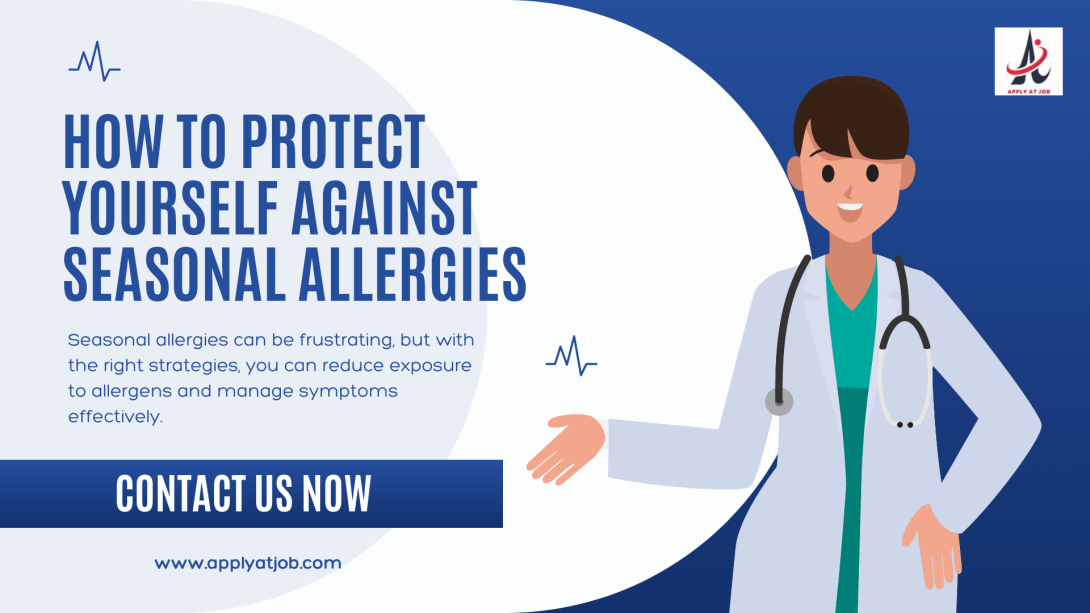
How to Guard Against Allergies Associated with Seasons
Millions of individuals worldwide suffer from seasonal allergies, which are often referred to as hay fever or allergic rhinitis. Pollen from grasses, trees, and weeds is one of the environmental allergens that causes these allergies, which cause symptoms including runny nose, itchy eyes, and sneezing. Many people find it difficult and uncomfortable to enjoy outdoor activities when the seasons change. Thankfully, there are strategies for safeguarding yourself and successfully controlling seasonal allergy symptoms. We'll look at the reasons, signs, and several ways to guard against seasonal allergies in this blog.
Seasonal allergies: What Causes Them?
The body's immune system overreacts to things like pollen, which results in seasonal allergies. The immune system misinterprets these allergens as dangerous intruders when they enter the body, which causes the release of substances like histamines. These substances produce the common allergy symptoms, such as eye, throat, and nose irritation.
Seasonal allergies are most often caused by the following allergens:
. Early springtime brings a lot of tree pollen.
. Peak times for grass pollen are in late spring and early summer.
. Fall and late summer are prime times for weed pollen.
. Spores of mold: May proliferate in moist or humid conditions, especially in the fall.
Typical Seasonal Allergy Symptoms
Seasonal allergies can cause a range of symptoms, but they often include:
. sneezing
. stuffy or runny nose
. eyes that are wet or itchy
. Coughing
. The postnasal drip
. Weary
. scratchy ears or throat
. breathing difficulties (in extreme situations)
Your quality of life may be greatly impacted by these symptoms, which can make it hard to focus, sleep, or enjoy outdoor activities. Thankfully, there are a number of methods for successfully reducing allergen exposure and managing symptoms.
How to Guard Against Seasonal Allergies
The following realistic actions can help prevent seasonal allergies and lessen their symptoms:
1. Keep an eye on pollen count:
Check the local pollen forecast before venturing outside. Information about daily pollen levels may be found on a lot of websites and weather applications. Try to spend as little time outside as possible on days when pollen counts are high, especially in the early morning and late afternoon when pollen is most prevalent. If you must go outside, think about using sunglasses or a mask to lessen your exposure to allergens in the air.
2. Close all doors and windows:
Even though it's nice to have the fresh air inside your house, closing your windows and doors during allergy season can help keep pollen out. To enhance interior air quality, turn on the air conditioning instead of opening the windows, and remember to change the filters on a regular basis.
3. Employ a HEPA air purifier:
You may help purify the air inside your house by using a High-Efficiency Particulate Air (HEPA) purifier to get rid of dust, pollen, and other allergens. To lessen your exposure to allergens while you sleep or unwind, place the purifier in your bedroom or living spaces.
4. Change clothes and take a shower after being outside:
After being outside, pollen can readily stick to your skin, hair, and clothing. As soon as you come home, take a shower and change into clean clothing to avoid carrying allergies inside. Moreover, washing your face and hands might help lower your exposure to pollen.
5. Wear hats and sunglasses outside:
A wide-brimmed hat will help keep allergens out of your hair and sunglasses can serve as a barrier to keep pollen out of your eyes. When you're outside, you may reduce your direct exposure to pollen by wearing these easy-to-use items.
6. Maintain a Clean Indoor Environment:
Maintaining your home's cleanliness can help lower allergy levels. To reduce your exposure to pollen and other allergies, try these cleaning tips:
. Use a vacuum with a HEPA filter to clean carpets and rugs.
. To capture allergens, dust surfaces on a regular basis using a moist cloth.
. To eliminate pollen, wash cushions, curtains, and bedding in hot water on a regular basis.
. Think about covering pillows and mattresses with allergen-proof coverings.
7. Maintain Hydration:
Water consumption can help thin mucus and ease congestion brought on by seasonal allergies. Herbal teas with anti-allergy properties, such as ginger or peppermint, may also be helpful.
8. Frequently Wash Your Pets:
Pets who spend a lot of time outside may carry pollen inside your house on their fur. During allergy season, regular pet bathing and grooming can help minimize the quantity of allergens your pets bring inside with them.
When to Consult a Physician:
It might be time to see a medical expert if your allergy symptoms are severe or continue even after you've taken precautions. An allergist can conduct tests to identify the precise allergens causing your symptoms and may suggest immunotherapy, or allergy injections, as a course of treatment to gradually desensitize your body to allergens.
Conclusion:
Although seasonal allergies can be annoying, you can successfully manage symptoms and limit your exposure to allergens by using the appropriate measures. You may guard against seasonal allergies and enjoy the outdoors more comfortably by keeping an eye on pollen levels, maintaining a clean home, and using the recommended treatments. Don't be afraid to seek the advice and treatment choices of a healthcare expert if you discover that managing your symptoms is too challenging.
You can visit our site: Applyatjob.com
https://applyatjob.com/hiring-employee
https://applyatjob.com/jobs




